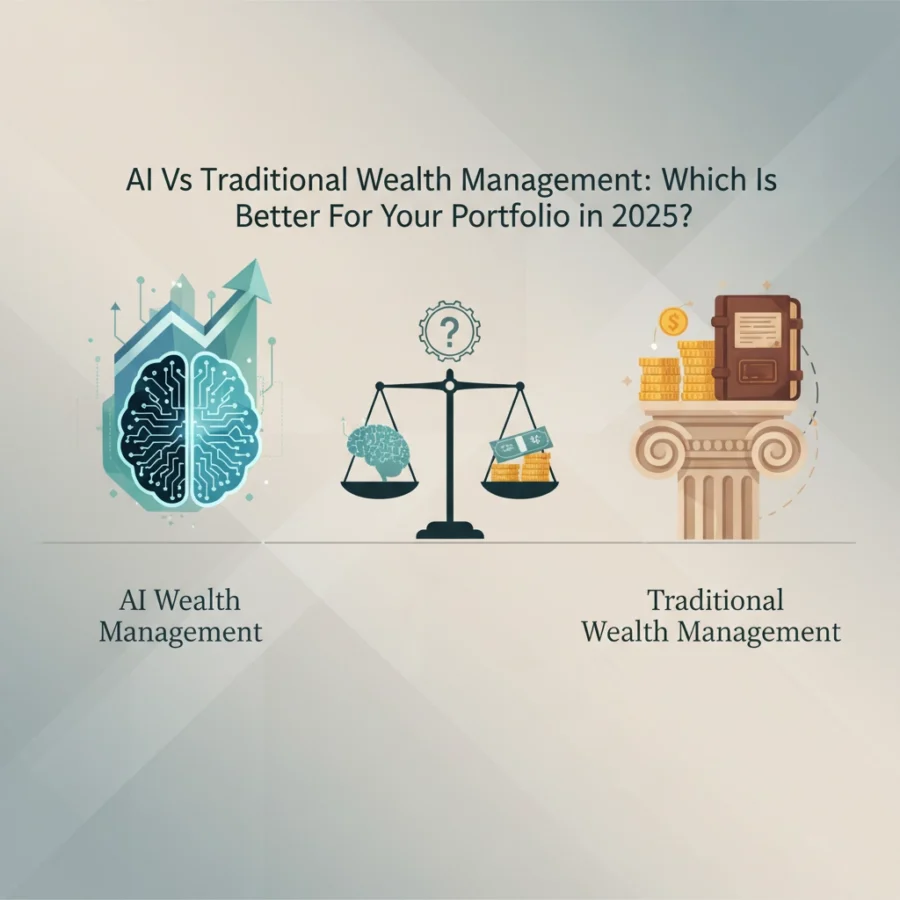The wealth management landscape has transformed dramatically over the past decade. As we navigate 2025, you're faced with an important decision: should you trust your financial future to artificial intelligence or stick with traditional human advisors? The answer isn't as straightforward as you might think.
AI now manages over $2 trillion in assets globally, with projections indicating this figure will surpass $10 trillion by 2030. Meanwhile, 65% of wealth management firms believe AI will actually improve their client relationships rather than replace them. This suggests the future isn't about choosing sides: it's about understanding which approach best serves your unique financial situation.
The Rise of AI-Enhanced Wealth Management
Artificial intelligence has revolutionized how we approach investment management, bringing sophisticated analytical capabilities that were once reserved for institutional investors to individual portfolios. AI-driven platforms process vast amounts of market data in real-time, identifying patterns and opportunities that human advisors might miss.

These systems excel at continuous portfolio monitoring and automatic rebalancing. While traditional advisors might review your portfolio quarterly, AI algorithms work 24/7, making micro-adjustments based on market movements, economic indicators, and your evolving risk profile. This constant vigilance means your investments remain optimally positioned regardless of when market opportunities arise.
The cost advantage is undeniable. AI-powered wealth management typically charges fees between 0.25% and 0.50% annually, compared to traditional advisory fees that range from 1% to 2% or higher. For high-net-worth individuals, this difference can translate to tens of thousands of dollars in savings each year.
Data-driven personalization represents another significant advantage. AI systems analyze your spending patterns, income fluctuations, and financial goals to create hyper-personalized investment strategies. They can process information from multiple sources: bank accounts, credit cards, investment accounts: to build a comprehensive picture of your financial life that updates in real-time.
However, AI's limitations become apparent when you need emotional guidance during market volatility. The technology lacks the human intuition required to understand when you're feeling anxious about a market downturn or celebrating a career milestone that might change your risk tolerance.
The Enduring Value of Traditional Wealth Management
Human financial advisors bring irreplaceable qualities to wealth management: empathy, experience, and the ability to see beyond the numbers. When markets crashed in 2020, it wasn't algorithms that prevented clients from panic-selling: it was human advisors providing reassurance and context.

Traditional wealth managers excel at holistic financial planning. They consider factors that algorithms struggle to quantify: your family dynamics, career aspirations, philanthropic goals, and personal values. This comprehensive approach becomes increasingly valuable as your wealth grows and your financial situation becomes more complex.
Consider estate planning: a critical concern for affluent families. While AI can optimize your investment allocation, it cannot navigate the emotional complexities of legacy planning or understand the nuances of family relationships that influence wealth transfer decisions. Human advisors build long-term relationships that span generations, becoming trusted confidants who understand your family's unique story.
The relationship aspect cannot be overstated. At Davies Wealth Management, we've seen how personal connections drive better financial outcomes. When clients trust their advisor, they're more likely to stay committed to long-term strategies during challenging periods. This trust is built through face-to-face conversations, shared experiences, and the advisor's ability to adapt advice based on subtle cues that AI cannot detect.
Traditional advisors also provide accountability that goes beyond portfolio performance. They help you stick to spending budgets, encourage systematic savings, and ensure you're taking advantage of tax-planning opportunities throughout the year.
Performance and Cost Analysis: The Numbers Don't Lie
When comparing investment performance, the picture becomes nuanced. AI-driven portfolios consistently deliver market-matching returns with lower volatility through systematic rebalancing and emotion-free decision-making. Studies show that robo-advisors typically achieve returns within 0.1% to 0.3% of their target benchmarks annually.

Traditional advisors, however, add value beyond pure investment returns. Their comprehensive planning often results in significant tax savings, optimized estate structures, and strategic financial decisions that compound over time. For high-net-worth clients, these benefits frequently exceed the additional advisory fees.
The cost equation shifts based on portfolio size. For portfolios under $500,000, AI-driven management offers clear cost advantages. But for portfolios exceeding $1 million, the additional services provided by human advisors: tax planning, estate optimization, business succession planning: often justify higher fees through tangible value creation.
The Hybrid Approach: Best of Both Worlds
The most sophisticated wealth management strategies in 2025 combine AI's analytical power with human expertise. This hybrid model is becoming the gold standard for affluent investors who want technological efficiency without sacrificing personal relationships.
Successful hybrid approaches use AI for portfolio monitoring, risk assessment, and tactical rebalancing while relying on human advisors for strategic planning, relationship management, and complex decision-making. The result is more responsive portfolio management at lower costs than traditional advisory models, combined with the emotional intelligence and holistic planning that only humans provide.
Many wealth management firms, including those serving high-net-worth clients, now incorporate AI tools to enhance their advisors' capabilities rather than replace them. This allows advisors to spend more time on high-value activities like strategic planning and client relationships while AI handles routine portfolio management tasks.
Making the Right Choice for Your Situation
Your decision should reflect your wealth level, financial complexity, and personal preferences. Consider AI-enhanced management if you have a straightforward financial situation, are comfortable with technology, and prioritize cost efficiency. These platforms work well for investors with clear goals and the discipline to stay committed to algorithmic recommendations.

Choose traditional wealth management if you have significant assets, complex financial needs, or value deep personal relationships in your financial planning. This approach becomes increasingly valuable as your wealth grows and your planning needs extend beyond investment management to include tax optimization, estate planning, and business succession strategies.
For most affluent investors, the optimal solution combines both approaches. Consider working with a traditional advisor who leverages AI tools, or use AI-powered platforms for your core portfolio while maintaining an advisory relationship for strategic planning and complex decisions.
Looking Ahead: The Future of Wealth Management
The wealth management industry continues evolving rapidly. By 2025, we're seeing increased integration between AI capabilities and human expertise, creating more sophisticated and responsive advisory services. The question isn't whether AI will replace human advisors: it's how these technologies will work together to provide better outcomes for investors.
At Davies Wealth Management, we recognize that the future belongs to firms that can seamlessly blend technological innovation with personalized service. Our clients benefit from AI-powered analytics and monitoring while maintaining the trusted relationships and comprehensive planning that have always been the foundation of successful wealth management.
The choice between AI and traditional wealth management isn't binary. Your financial success depends on selecting the approach: or combination of approaches: that best aligns with your goals, complexity, and preferences. As the industry continues to evolve, staying informed about these developments will help you make decisions that optimize both your returns and your peace of mind.
For more insights on creating a comprehensive financial strategy that incorporates both technological innovation and personalized planning, explore our 5-year financial planning guide or learn more about our approach to retirement planning in today's evolving landscape.



Leave a Reply